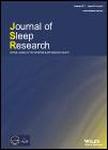版权所有:内蒙古大学图书馆 技术提供:维普资讯• 智图
内蒙古自治区呼和浩特市赛罕区大学西街235号 邮编: 010021

作者机构:US Army Med Res & Mat Command Telemed & Adv Technol Res Ctr Dept Def Biotechnol High Performance Comp Softwar Ft Detrick MD USA Walter Reed Army Inst Res Behav Biol Branch Silver Spring MD USA
出 版 物:《JOURNAL OF SLEEP RESEARCH》 (睡眠研究杂志)
年 卷 期:2017年第26卷第6期
页 面:820-831页
核心收录:
学科分类:1002[医学-临床医学] 1001[医学-基础医学(可授医学、理学学位)] 10[医学]
基 金:Military Operational Medicine Research Area Directorate of the US Army Medical Research and Materiel Command, Fort Detrick, MD US Department of Defense Medical Research and Development Program [DMRDP_13200]
主 题:Bayesian learning individualized modelling performance prediction recursive parameter estimation
摘 要:Existing mathematical models for predicting neurobehavioural performance are not suited for mobile computing platforms because they cannot adapt model parameters automatically in real time to reflect individual differences in the effects of sleep loss. We used an extended Kalman filter to develop a computationally efficient algorithm that continually adapts the parameters of the recently developed Unified Model of Performance (UMP) to an individual. The algorithm accomplishes this in real time as new performance data for the individual become available. We assessed the algorithm s performance by simulating real-time model individualization for 18 subjects subjected to 64 h of total sleep deprivation (TSD) and 7 days of chronic sleep restriction (CSR) with 3 h of time in bed per night, using psychomotor vigilance task (PVT) data collected every 2 h during wakefulness. This UMP individualization process produced parameter estimates that progressively approached the solution produced by a post-hoc fitting of model parameters using all data. The minimum number of PVT measurements needed to individualize the model parameters depended upon the type of sleep-loss challenge, with similar to 30 required for TSD and similar to 70 for CSR. However, model individualization depended upon the overall duration of data collection, yielding increasingly accurate model parameters with greater number of days. Interestingly, reducing the PVT sampling frequency by a factor of two did not notably hamper model individualization. The proposed algorithm facilitates real-time learning of an individual s trait-like responses to sleep loss and enables the development of individualized performance prediction models for use in a mobile computing platform.